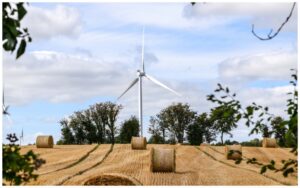Six things you maybe didn’t know about Ireland’s wind farms
Irish people want the affordable energy, the clean energy and the energy security that Irish wind farms provide. If we all work together we can build a future with cleaner air, warmer homes and thousands of green jobs in revitalised rural and coastal communities.
Wind farms are already helping Irish families, farms and businesses. We can do much more in the years to come.
Here’s a list of six things you maybe didn’t know about Ireland’s chief source of renewable energy:
1. They provide a lot of power
So far in 2024, Ireland’s wind farms have provided 40 per cent of the country’s electricity and, at times, three-quarters of our power has come from wind farms.
2. They’re very popular
In the most recent opinion poll 80 per cent of people supported wind energy. And in an independent report published last year by the SEAI – where they spoke to people living within 1 kilometre of existing wind farms – two-thirds of those people, living right next to wind turbines, want to see more wind farms built in Ireland.
3. They save a lot of money
The wholesale price of electricity, on days with large amounts of wind energy, is often half what it is on the days when we need to rely on expensive imported fossil fuels. Lower wholesale prices help to push down electricity bills and helps Irish families and businesses struggling with high energy costs.
4. They keep money in Ireland
If we didn’t have our existing wind farms Ireland would have spent €1.3 billion last year for gas, most of which we would have had to import. We want to keep that money in Ireland, supporting our economy, and not in the pockets of the fossil fuel industry.
5. They employ a lot of people
There are approximately 6,000 people working in the Irish wind industry and we’re going to need thousands more in the years to come as we build new wind farms on and offshore.
6. They invest in rural Ireland
Irish wind farms pay more than €50 million annually to rural County Councils and this is growing every year. Along with millions more in community benefit funds – they’re repairing local roads, keeping libraries open and supporting local businesses in rural Ireland.
Source : Kilkenny Live
